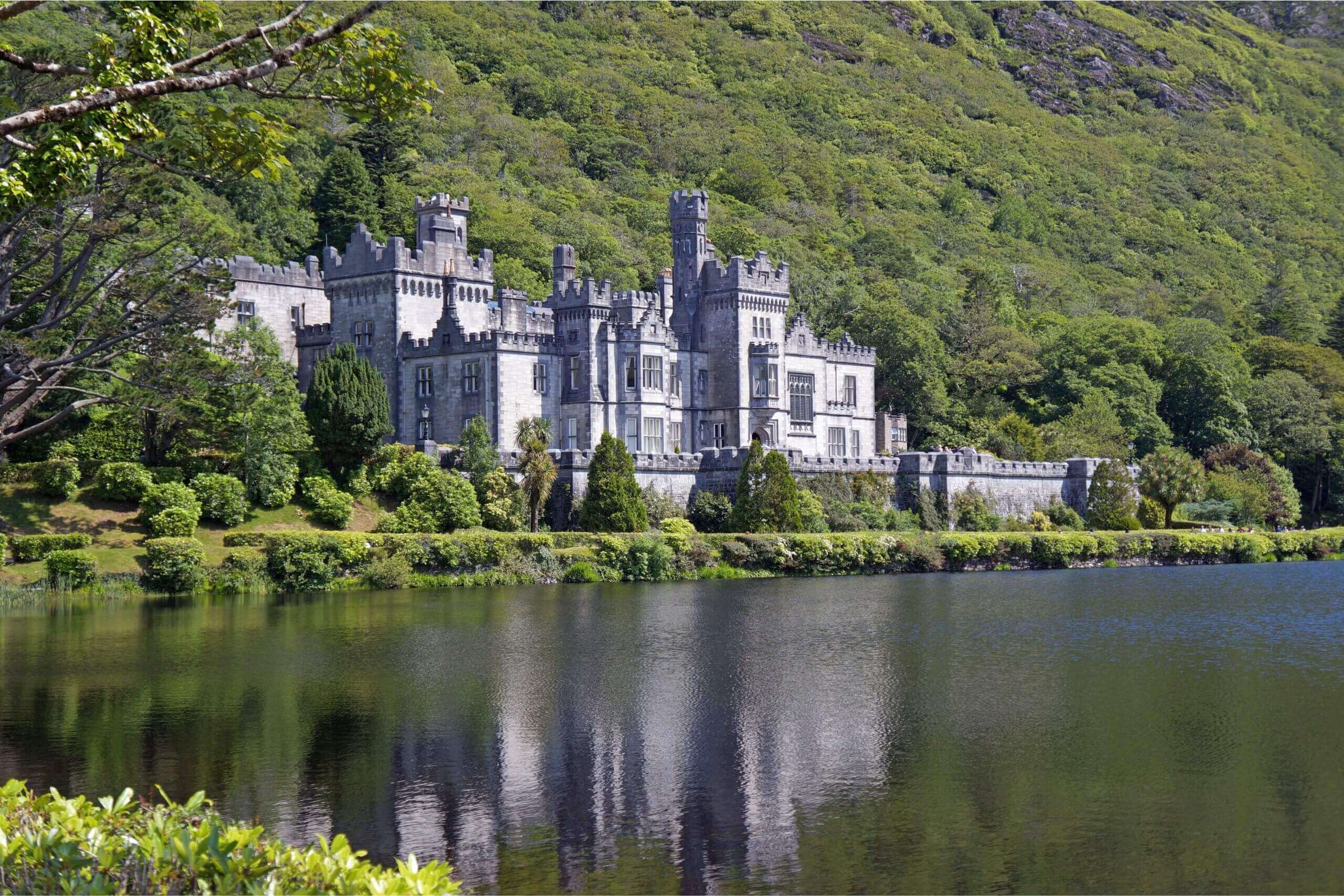In this guide, you will learn everything you need to know about planning or attending a destination wedding in Ireland.
Weddings in Ireland: What You Need To Know
Ireland is a renowned wedding destination, offering couples a chance to celebrate their love in a truly unique setting.
From the wild cliffs of the coast to the rolling green hills of the countryside, there is no shortage of breathtaking locations to host a destination wedding.
And with its rich history and cultural heritage, Ireland is also a place where love stories have been unfolding for centuries.
No matter if you choose to exchange your vows in an ancient castle or on the shores of a pristine lake, you are sure to create memories that will last a lifetime.
Whether you’re looking for an intimate elopement or a grand affair, a destination wedding in Ireland is sure to be an unforgettable experience.
With so much to offer, it is no wonder that more and more couples are choosing Ireland as the perfect place to tie the knot.
But first: you need to know where in the world Ireland is…
Where is Ireland?
Ireland is located in north-western Europe, and occupies 5/6 of the westernmost major island of the British Isles.
The Republic of Ireland shares the only land border with Northern Ireland (UK) in the north, and it is otherwise surrounded by the Atlantic Ocean to the west, the Celtic Sea to the south, St George’s Channel to the south-east, and the Irish Sea to the east.
Area: 26,435 sq mi (68,466 sq km), Population: (2022 est.) 5,054,000, Capital: Dublin.
Ireland Facts To Know:
- Language:English and Irish (Gaeilge)
- Currency: Euro (EUR)
- Airports: Dublin Airport (DUB), Cork Airport (ORK), Shannon Airport (SNN)
- Official Tourism Website:https://www.ireland.com/en/
- Driving side: Left
Below you will find some more useful information about visiting Ireland for your special day:
4 Tips for Planning a Destination Wedding in Ireland
Planning a wedding can be stressful. Planning a destination wedding can be even more stressful!
But it doesn’t have to be. Here are some tips and things you need to know for planning a destination wedding in Ireland:
1. Choose a date that works for both you and your guests
Choosing a wedding date can be a daunting task, whether you are planning on getting married in Ireland or closer to home.
You want to make sure that you pick a date that works for both you and your guests.
Here are some tips to help you choose the perfect wedding date:
- How To Pick A Date For A Wedding?
- When To Send Out Save The Date For Wedding?
- How To Write Date On Wedding Invitation?
2. Decide on a budget
When it comes to having an Irish wedding, there are a lot of different factors that come into play – from the guest list to the venue.
But one of the most important decisions you’ll make is how much you’re willing to spend.
Here are some tips on how to decide on a budget for your wedding:
- How To Plan A Wedding On A Budget?
- What Is A Good Wedding Budget?
- How To Decorate A Wedding Reception Hall On A Budget?
3. Find a venue that fits your vision and budget
No one ever said wedding planning was easy. In fact, it can often feel downright daunting.
Here’s some useful resources for finding a wedding venue in Ireland:
4. Hire a wedding planner to take care of the details
A wedding planner can take care of everything for you, from booking vendors to creating a timeline for the day.
Here are some tips on how to find and hire the right planner for your big day in Ireland
Ireland Weddings: Key Information
Getting married abroad is a big decision. There’s a lot of things you need to be aware of if you want your big day to run smoothly.
To help, we have put together some useful information about getting married in Ireland:
- What is the average cost of a wedding in Ireland?
- What are the marriage requirements for Ireland?
- What is the weather like in Ireland?
- What should you pack for a trip to Ireland?
- What things are there to do in Ireland?
- What are the best Irish wedding venues?
Read on to find out more:
How Much Does a Wedding in Ireland Cost?
Marriage notification fee is €200, and it is non refundable.
Legal Requirements for Getting Married in Ireland
When applying for a marriage license, you will need to provide the following documents:
- Valid passport, and a color photocopy of the photo page.
- National identity card from an EU country accepting them as a travel document.
- Original and photocopy of your birth certificates.
- Proof of address – original and photocopy dated within last 3 months
- Capture of data form.
- If you have already been married, provide the relevant documentation to demonstrate that you are either divorced or widowed.
- For a previous civil partnership, you will need the final decree of dissolution.
- Declarations of no impediment.
Other legal requirements are:
- To apply for a marriage license, one must be at least 18 years old.
- You must give 3 months notice, in person, at a civil registration service. This applies to all civil, religious and secular marriages. – However, if you are not living in Ireland and you want to give notice by post, you can contact a civil registration service.
- If everything is in order, the registrar will give you a marriage registration form. This is valid for 6 months from the date you intend to get married.
- You will need to attend an interview with the registrar if: you are an EU national marrying a non-EU national or one of you is a foreign national.
- For a marriage to be legal, the ceremony must be performed by a solemniser who must be on the Register of Solemnisers.
- 2 witnesses are required, older than 18 years old.
- If your documents are not in English or Irish you must provide translations.
- Public documents issued by an EU member state should be accompanied by a Multilingual Standard Form (MSF), which is a translation and authentication document accepted across the EU.
- If you hold non EU documents you will require an apostille stamp or letter from your Embassy/Diplomatic Mission confirming the authenticity of your certificates.
- If any of you does not speak English or Irish, a translator needs to be present.
Before making any wedding or travel preparations, make sure you have all the paperwork needed for your marriage to be recognized in your home country by checking with the local county clerk or marriage official where you intend to marry.
What you need to have in your possession before leaving the country is a legal document that can confirm that your marriage is legitimate and has been registered – the marriage certificate.
For more details please check the Irish government website.
What Is The Weather Like in Ireland?
Since it is the mildest season, the summer, which lasts from June to August, is the ideal time to visit Ireland. Although it rains often and may get very chilly at times (particularly in June), the days are long and you may even be able to get a glimpse of the sun peeping through the clouds.
Although the weather is still tolerable in September, the days are shorter than in the preceding months and the sky is often overcast.
What should you pack for your trip?
In the winter, pack warm clothing such as a sweater, coat, and a raincoat.
When packing for the summer, be sure to pack clothing appropriate for spring and fall: a jacket and a sweater, as well as a raincoat or an umbrella.
Ireland Weather By Month
Below you will find some useful information and handy tables of weather information to help you pick the best month to visit Ireland:
Average Temperatures in Ireland
The table below shows the average temperatures in Ireland each month:
| Month | Min (°C) | Max (°C) | Mean (°C) | Min (°F) | Max (°F) | Mean (°F) |
| January | 2.3 | 8.2 | 5.3 | 36 | 47 | 41.5 |
| February | 2.1 | 8.6 | 5.4 | 36 | 47 | 41.6 |
| March | 2.7 | 10.2 | 6.4 | 37 | 50 | 43.6 |
| April | 3.9 | 12.3 | 8.1 | 39 | 54 | 46.6 |
| May | 6.4 | 15 | 10.7 | 44 | 59 | 51.3 |
| June | 9 | 17.7 | 13.4 | 48 | 64 | 56.1 |
| July | 11 | 19.4 | 15.2 | 52 | 67 | 59.4 |
| August | 10.9 | 19.1 | 15 | 52 | 66 | 59 |
| September | 9.1 | 17 | 13 | 48 | 63 | 55.5 |
| October | 6.7 | 13.7 | 10.2 | 44 | 57 | 50.4 |
| November | 4.3 | 10.4 | 7.3 | 40 | 51 | 45.2 |
| December | 2.6 | 8.5 | 5.6 | 37 | 47 | 42 |
| Year | 6 | 13.4 | 9.65 | 42.7 | 56.1 | 49.5 |
Average Rainfall in Ireland
The table below shows the average rainfall in Ireland each month:
| Month | Millimeters | Inches | Days |
| January | 65 | 2.6 | 13 |
| February | 50 | 2 | 10 |
| March | 55 | 2.2 | 11 |
| April | 55 | 2.2 | 11 |
| May | 60 | 2.4 | 11 |
| June | 65 | 2.5 | 10 |
| July | 55 | 2.2 | 11 |
| August | 75 | 3 | 12 |
| September | 60 | 2.4 | 10 |
| October | 80 | 3.1 | 12 |
| November | 75 | 3 | 12 |
| December | 75 | 3 | 13 |
| Year | 760 | 29.9 | 135 |
Sunshine Hours in Ireland
The table below shows the average sunshine hours in Ireland each month:
| Month | Average | Total |
| January | 2 | 60 |
| February | 2.5 | 75 |
| March | 3.5 | 110 |
| April | 5.5 | 160 |
| May | 6 | 190 |
| June | 6 | 175 |
| July | 5.5 | 165 |
| August | 5 | 160 |
| September | 4.5 | 130 |
| October | 3.5 | 100 |
| November | 2.5 | 70 |
| December | 1.5 | 55 |
| Year | 4 | 1445 |
Sea Temperatures in Ireland
The table below shows the average sea temperatures in Ireland each month:
| Month | Celsius (°C) | Fahrenheit (°F) |
| January | 9 | 48 |
| February | 8 | 46 |
| March | 8 | 46 |
| April | 9 | 47 |
| May | 10 | 51 |
| June | 13 | 55 |
| July | 15 | 59 |
| August | 16 | 60 |
| September | 15 | 60 |
| October | 14 | 57 |
| November | 12 | 54 |
| December | 10 | 51 |
| Year | 11.6 | 52.9 |
What To Wear in Ireland? (Packing Tips)
It can be difficult to know what to pack for your vacation. However, there are a few things you should keep in mind when preparing for your trip.
We’ve put together some tips on what to wear in Ireland so that you can make the most of your time there.
- Comfortable walking shoes: You’ll want to explore all of the amazing sites Ireland has to offer, so comfortable shoes are a must.
- Warm layers: Even in summer, the weather can be cool and unpredictable, so pack cozy sweaters or jackets that you can layer.
- Umbrella/Raincoat: Even if the forecast is sunny, it’s always a good idea to be prepared for a sudden shower.
- Camera: With its stunning scenery and castles, Ireland is a photographer’s dream. Don’t forget to pack your camera!
- Passport: Other essential items to pack include a valid passport and any necessary visas.
- Travel insurance: Make sure you have travel insurance that will cover you in case of any medical emergencies or lost baggage.
- Chargers: Also, be sure to bring along any chargers and travel power adapters you’ll need for your electronic devices.
- First-aid kit: It is also a good idea to pack a first-aid kit, in case of any minor injuries, and also any essential medications.
- Sense of adventure: The best part about traveling is experiencing new things, so make sure to bring a sense of adventure!
Things to Do in Ireland
There are many different things to do in Ireland, no matter what time of year you visit.
Here is a list of some of the top activities to enjoy during your stay:
- Jameson Distillery Bow St.
- Irish Whiskey Museum
- Cliffs of Moher
- Connemara National Park & Visitor Center
- Killarney National Park
- Kilmainham Gaol Museum
- Kilkenny Castle
- Wild Atlantic Way
- Trinity College Library
- Dingle Peninsula
- Ring of Kerry
- Glendalough
- Rock of Cashel
- Ashford Castle
Best Irish Wedding Venues & Hotels
With so many stunning locations to choose from, how do you know which is the best wedding venue in Ireland?
Here are our picks for the top spots to tie the knot, as well as hotels to stay in:
Wedding Venues in Ireland
- Ballymagarvey Village in Co. Meath
- Tinakilly House in Co. Wicklow
- Bellingham Castle in Co. Louth
- Ashford Castle in Co. Mayo
- Marlfield House in Co. Wexford
- Gloster House in Co. Offaly
- Virginia Park Lodge in Co. Cavan
- Ballyfin in Co. Laois
- The Westbury in Dublin
- Fota Island Resort in Co. Cork
Hotels in Ireland
- Hard Rock Hotel Dublin
- The Wilder – Dublin
- Number 31 – Dublin
- Butler House – Kilkenny
- Bridge View B&B – Kilkenny
- Earls Court House – Killarney
- Woodlawn House – Killarney
- Rockhill House – Letterkenny
- Lough View Cottage – Carrigart
- Glensheen – Ennis
- Aidan’s Island – Westport



